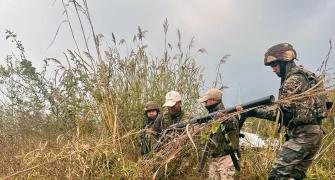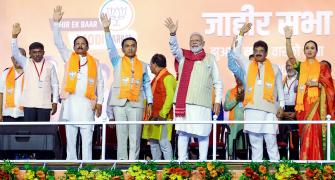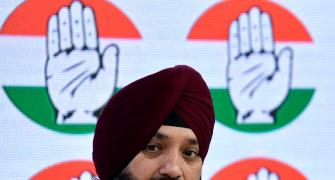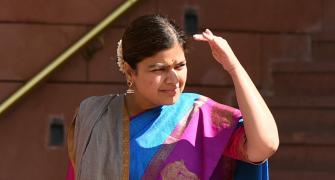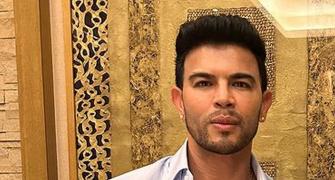The Australian bandwagon is showing no signs of slowing down. Across countries, across sport, Australia is emerging the biggest exporter of coaches; even Practennis, the tiny tennis academy in Andheri, Mumbai, has formed a connection Down Under.
Former Aussie Davis Cupper Luke Smith and his academy in Adelaide will conduct an 11-month training programme with the cadets at the Practennis school of tennis.
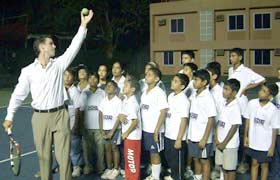 Smith, whose father Peter has been in the coaching business for more than 30 years now, landed in India on Thursday and already got a taste of the heat and dust, and, most importantly the well-cocooned dreams.
Smith, whose father Peter has been in the coaching business for more than 30 years now, landed in India on Thursday and already got a taste of the heat and dust, and, most importantly the well-cocooned dreams.
"As far as raw talent goes the Indian kids are as good as the Australians," said Smith after a three-hour session outside the courts on Tuesday morning. "But these kids have a greater desire to succeed.
"The kids here have responded well to different techniques. They found it a bit aggressive in the beginning; the training was full-on, but when they see instant improvement they are keener to learn. What we are trying to do here is produce professional tennis players. They need a solid, knowledgeable base to go on from here."
Shifting from a club that has 40 courts (grass, hard, clay, artificial turf; name it we have it) to two rough cement courts in the campus of a suburban school may have come as a bit of a shock, but Smith smiles it away. A tennis court, whichever variety, he thinks is still "home".
"The facilities are not the same, you definitely cannot compare them to the academy I run back home in Adelaide. That one has 40 courts; they have nutritionists and sports psychologists right from the early age. The kids there are more sports-oriented."
Another area the Aussies are leading in is sports psychology. Though it is still a new concept in India and mainly employed by international players, even 12-14 year-olds are given a dose of it in sports coaching classes in Australia.
"It's good if the youngsters are exposed to sports psychology at an early age. Because once you are already playing, thinking in a certain manner it is difficult to impress. When you are a professional player you obviously know how to hit a backhand down the line. But the question is whether you can hit it at 6-6; whether you can hit it when you need it the most. That's where the mental training comes in."
As a player, Smith missed the experience of coming to India though he was on tour for six years. But as soon as an arrangement with Practennis was brokered by one of the students, who had been at the Adelaide academy the previous year and showed distinct improvement, Smith was ready for the trip.
"I had no problem accepting to come to India; maybe, my parents were a little uncomfortable. They are not travellers like me. Actually, I had to pull out from a couple of Challenger events early in my career due to injury, so I am quite happy finally making it here.
"The heat is not a factor since I come from Adelaide, where it is 35-40 degrees. It's only a little more humid here. But where I feel at home is on the tennis court. I have been training with kids for the past two years full-time, though I started coaching when I was 14. I think I am a natural at coaching. I used to work with my dad at the academy and having been a professional tennis player can bring that experience into play."
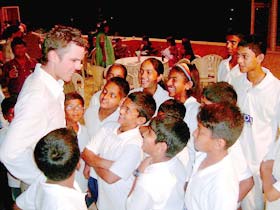 The Australian will be in India for a month and then be substituted by his father and another assistant coach from his academy. While he focuses on coaching, Smith has been supplied with a fitness trainer by Practennis.
The Australian will be in India for a month and then be substituted by his father and another assistant coach from his academy. While he focuses on coaching, Smith has been supplied with a fitness trainer by Practennis.
Fitness, he believes, is the biggest factor in the game for the past two-three years.
"Tennis is a tough sport. Today the tennis players need to be as fit as professional swimmers.
"There is no off-season and players can't afford to miss tournaments, because, effectively, you are losing the points and the money. But the Australian Open was the best example of how players are starting to feel the pressure of a full-season. You cannot stay at your peak fitness throughout the year and need at least 2-3 months break."
It was because of persistent injuries that Smith's career was cut short two years ago, when he was 27. Another example of the growing strain on tennis players is the decline of his former Davis Cup teammate and doubles partner Lleyton Hewitt.
"Lleyton Hewitt is near the end of his career. He is only 24 but he has been playing since he was 15; so that means he's been on tour for nine years. It's about as long as professional players last. He is mentally and physically spent.
"Now that he has become a father has also softened him a bit. He always survived on his killer instinct. Unless he sort of finds a different approach to tennis he may not be able to come back to top form."
Hewitt has failed to add a Grand Slam title to his name after the 2002 Wimbledon, and his downslide seems to have coincided with a general dearth of promising youngsters. Chris Guccione and Peter Luczak recently helped Australia beat Switzerland in Geneva on clay in the first round of Davis Cup, but Smith thinks tennis is constantly fighting Aussie rules football, soccer and cricket for its share of new talent.
"Tennis Australia is now undergoing a revamp. They have decided to involve more ex-professional players like me instead of old coaches, who have been teaching the same ideas for the past 20-30 years."
India sure is taking a cue too.

